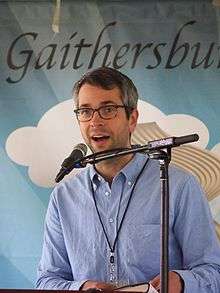Anthony Marra
Anthony Marra | |
|---|---|
 Reading at the 2016 Gaithersburg Book Festival | |
| Born | 1984 Washington, D.C. |
| Occupation | Writer |
| Education | Landon School |
| Alma mater | University of Southern California; Iowa Writers Workshop |
| Genre | fiction |
| Notable awards | Anisfield-Wolf Book Award (2014) A Constellation of Vital Phenomena |
| Website | |
| anthonymarra | |
Anthony Marra is an American fiction writer.
Career
Anthony Marra attended high school at the Landon School in Bethesda, Md., and graduated with a bachelor's degree in creative writing from the University of Southern California Department of English, and the Iowa Writers' Workshop at the University of Iowa with an MFA.[1] He was a 2011–2013 Stegner Fellow at Stanford University.[2] Currently, he teaches at Stanford University as the Jones Lecturer in Fiction. He has lived and studied in Eastern Europe, and now resides in Oakland, Calif.
He has contributed pieces to The Atlantic,[3] Narrative Magazine,[4] and MAKE Magazine.[5]
His debut novel, A Constellation of Vital Phenomena, was published in May 2013 by Hogarth.
Accolades
Marra's first novel, A Constellation of Vital Phenomena, received the inaugural John Leonard Prize given by the National Book Critics Circle for a first book.[6][7] It also won an Anisfield-Wolf Book Award.[8] and the French Grand prix des lectrices de Elle
In 2010, his short story "Chechnya" won a 2010 Pushcart Prize and the 2010 Narrative Prize. He also won a 2012 Whiting Award.[9]
In 2016, his short story "The Grozny Tourist Bureau", initially published in Zoetrope: All Story won a National Magazine Award for Fiction.[10] In 2018, Marra won the Simpson Family Literary Prize[11], which is awarded to an excellent mid-career author.
Works
- "Chechnya" (2009; a short story)
- "The Wolves of Bilaya Forest" (2012; a short story)
- A Constellation of Vital Phenomena (2013; a novel)
- The Tsar of Love and Techno: Stories (2015; a collection of short stories)
Adaptations
- The Tsar of Love and Techno: Stories - a Penguin Random House audiobook narrated by Mark Bramhall, Beata Pozniak. It was listed in the Top 5 Audiobooks of the Year by The Washington Post.
References
- This Year’s Award Winners | Whiting Writers' Awards | Programs | Mrs. Giles Whiting Foundation Archived February 20, 2014, at the Wayback Machine
- Stegner Fellowship – Complete List of Stegner Fellows – Stanford Creative Writing Program
- https://www.amazon.com/dp/B003TXT5HE
- Anthony Marra | Narrative Magazine
- Review: Everything Flows by Vasily Grossman | MAKE Literary Productions, NFP Archived July 14, 2011, at the Wayback Machine
- Kirsten Reach (January 14, 2014). "NBCC finalists announced". Melville House Publishing. Retrieved January 14, 2014.
- "Announcing the National Book Critics Awards Finalists for Publishing Year 2013". National Book Critics Circle. January 14, 2014. Archived from the original on January 15, 2014. Retrieved January 14, 2014.
- http://www.anisfield-wolf.org
- "2012 Whiting Writers' Award- Fiction – Stanford Creative Writing Program". Archived from the original on November 2, 2012. Retrieved October 24, 2012.
- American Society of Magazine Editors, Ellie Awards 2016 Winners Announced, http://www.magazine.org/asme/ellie-awards-2016-winners-announced Archived November 15, 2016, at the Wayback Machine
- "Prize". Simpson Family Literary Project. Retrieved April 5, 2018.